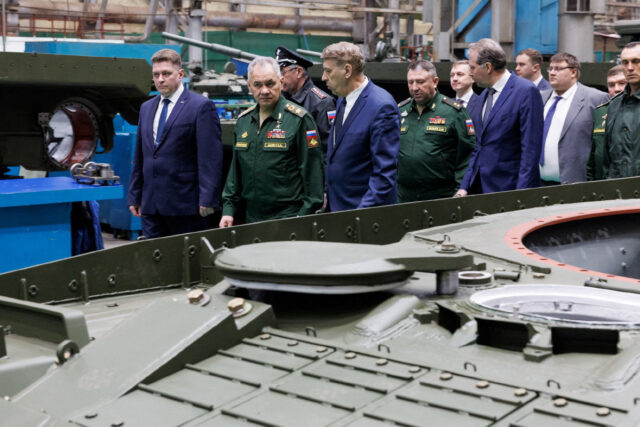On Friday, Russian Defence Minister Sergei Shoigu highlighted the significant uptick in the production of military hardware, including tanks and heavy flamethrower systems, during a visit to a tank factory in Omsk, Siberia.
Despite these advancements, Shoigu noted the need for increased production of tank protection equipment to bolster Russian military capabilities further.
During his tour, captured in a ministry-released video, Shoigu commended the Omsk plant workers for surpassing production expectations. “The Omsk plant is fulfilling the programme – I can say it is even over-fulfilling the programme,” Shoigu stated, acknowledging the resolution of most issues from previous visits.
This ramp-up in production is in response to significant military equipment losses in the ongoing conflict in Ukraine, where, according to the International Institute for Strategic Studies, Russia has lost over 3,000 tanks, equivalent to its entire pre-war active inventory. As a result, older tanks have been reactivated from storage.
Shoigu has directed factory leaders to enhance the production of protective equipment for tanks and emphasized the importance of supplying tank repair brigades. “Now we need to significantly increase the additional kits that we need to put on those vehicles that are in combat,” he remarked.
Concurrently, Russian military actions continue to intensify in Ukraine, particularly in the strategically vital town of Chasiv Yar, which is currently under heavy bombardment by Russian forces.
The aim is to capture the town by May 9, coinciding with Russia’s commemoration of its World War Two victory over Nazi Germany.
Further, Shoigu was informed that the Omsk factory had more than doubled its output of “Solntsepek” heavy flamethrower systems and that a new model of the T-80BVM main battle tank was prepared for deployment.
The factory has expanded its workforce by 1,200 since last year and shifted to a two-shift system to meet production demands.
Shoigu also highlighted the production of anti-drone systems, a priority given the frequent drone strikes by Kyiv on Russian energy facilities, which have disrupted the global oil supply and influenced oil prices.
With Inputs From Reuters





